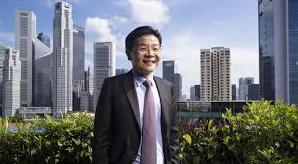Deputy Prime Minister and Finance Minister Lawrence Wong announced on Tuesday (Oct. 25) that Singapore will commit to achieving net-zero emissions by
Deputy Prime Minister and Finance Minister Lawrence Wong announced on Tuesday (Oct. 25) that Singapore will commit to achieving net-zero emissions by 2050. Additionally, the country will aim to reduce its emissions to 60 MtCO2e by 2030, after peaking emissions earlier. These new climate goals will be formally submitted to the United Nations Framework on Climate Change at the 27th United Nations Climate Change Conference (COP27), scheduled for November.
Wong made the announcement during his Singapore Energy Lecture at the Singapore International Energy Week. The goals were first introduced by Wong during the 2022 Budget.
Dependent on Global Commitment
During his speech, Wong addressed the global energy crisis, exacerbated by the war in Ukraine, and emphasized the need to increase efforts to transition to greener energy sources. “The world cannot afford to choose between an energy crisis and a climate crisis,” Wong stressed. He described Singapore’s net-zero target by 2050 as a “stretch goal,” given the country’s limited capacity to deploy renewable energy on a large scale.
Singapore’s ability to meet these ambitious targets relies on sustained international commitment to the Paris Agreement and other climate pledges. Additionally, as an energy-disadvantaged nation, Singapore will depend on technological advancements in decarbonization and international cooperation, Wong added.
Initiatives for a Sustainable Future
Wong outlined several initiatives to support Singapore’s transition to net-zero emissions. Among them, carbon taxes will progressively rise to S$50-S$80 per tCO2e by 2030. While mindful of the potential financial burden this may place on businesses and consumers, Wong noted that targeted relief would be provided.
A national hydrogen strategy will be introduced to explore the use of low-carbon hydrogen as a green energy source in the power, maritime, and aviation sectors. Furthermore, the GreenGov.SG initiative will lead to the public sector achieving net-zero emissions by 2045. Jurong Lake District is also slated to become a net-zero development by 2045.
Wong emphasized the importance of green financing to support these initiatives, noting that trillions of dollars in infrastructure investments will be required for Southeast Asia’s energy transition.
Previous Climate Goals
Singapore had previously committed to peaking emissions at 65 MtCO2e by 2030 under its Nationally Determined Contribution (NDC). The updated targets build on this by setting a more defined path to net-zero emissions by 2050. Wong’s announcement follows public consultations and engagements with stakeholders under the Singapore Green Plan 2030.
Singapore’s emissions in 2019 stood at 51.5 MtCO2e and rose to 52.8 MtCO2e in 2020.
Top image via Gawain Pek.



COMMENTS